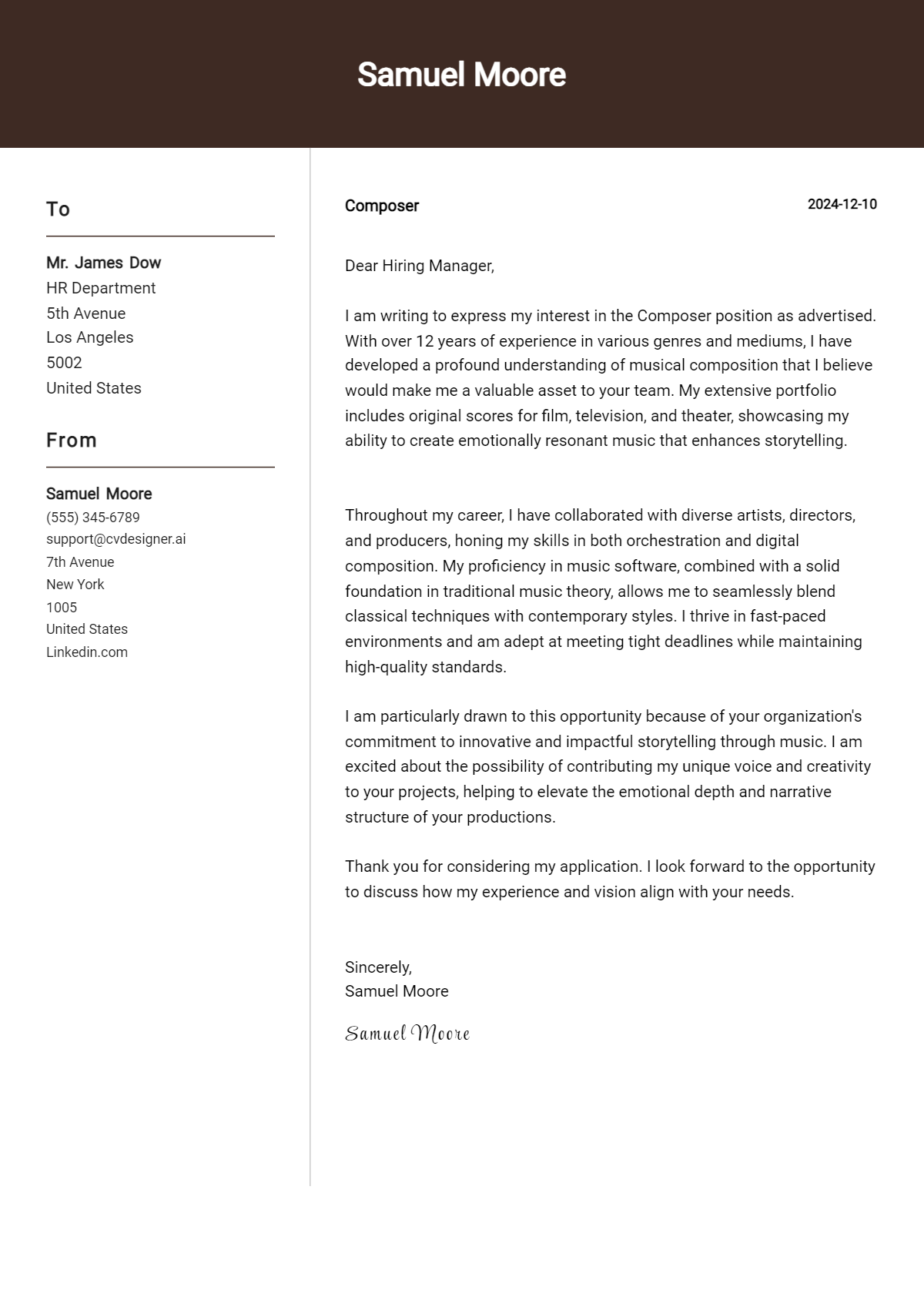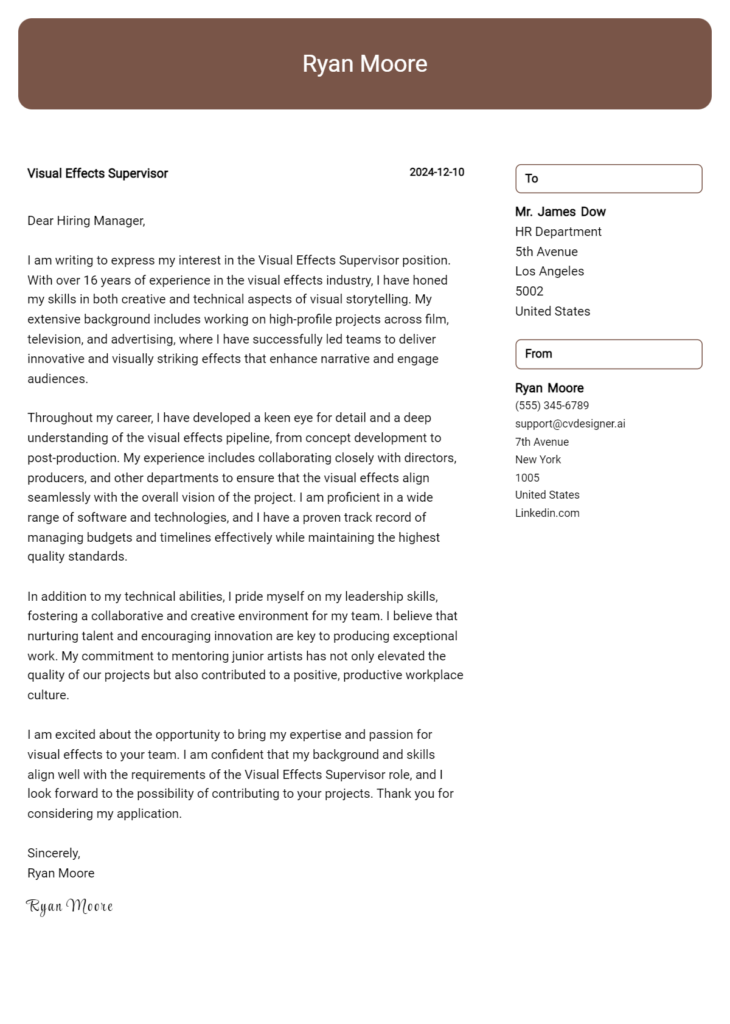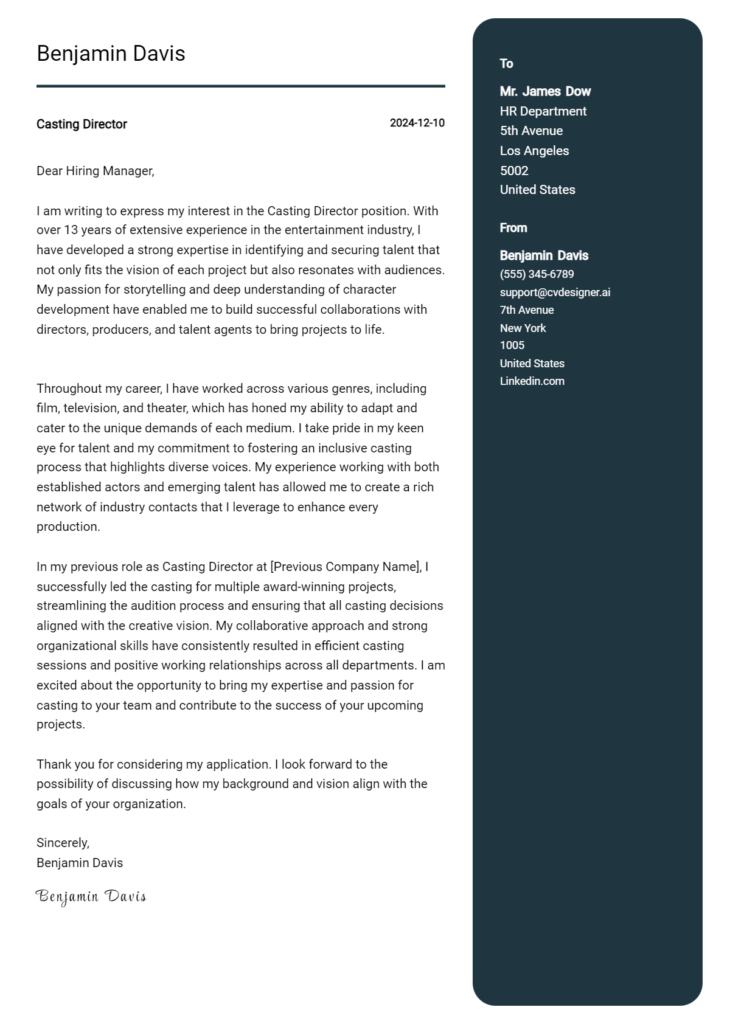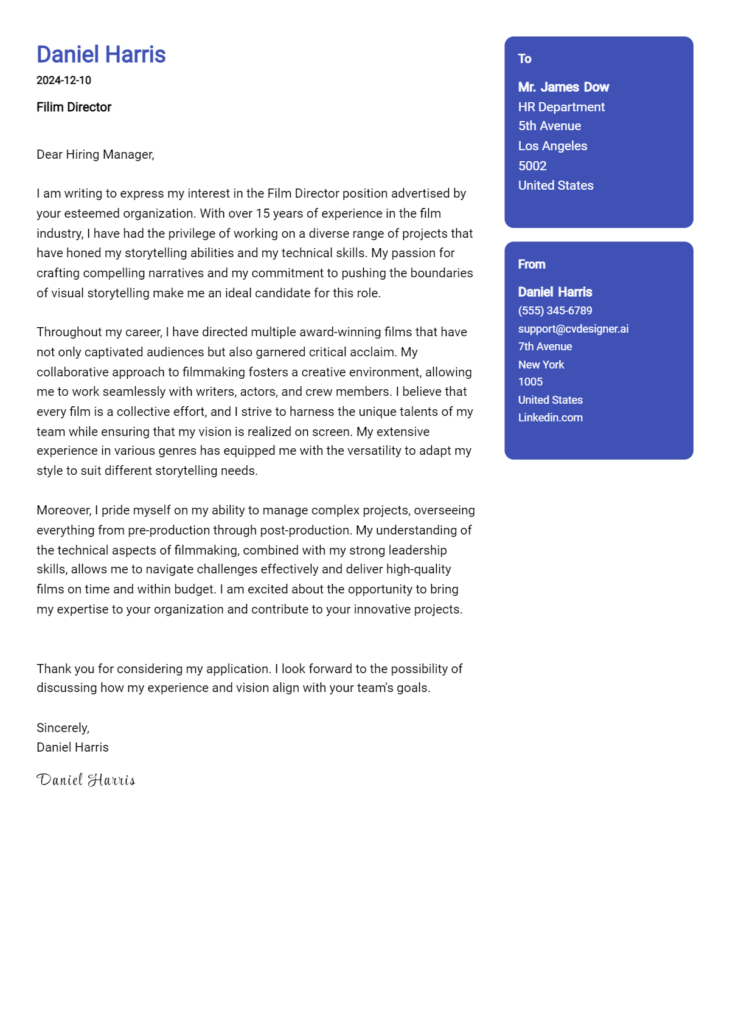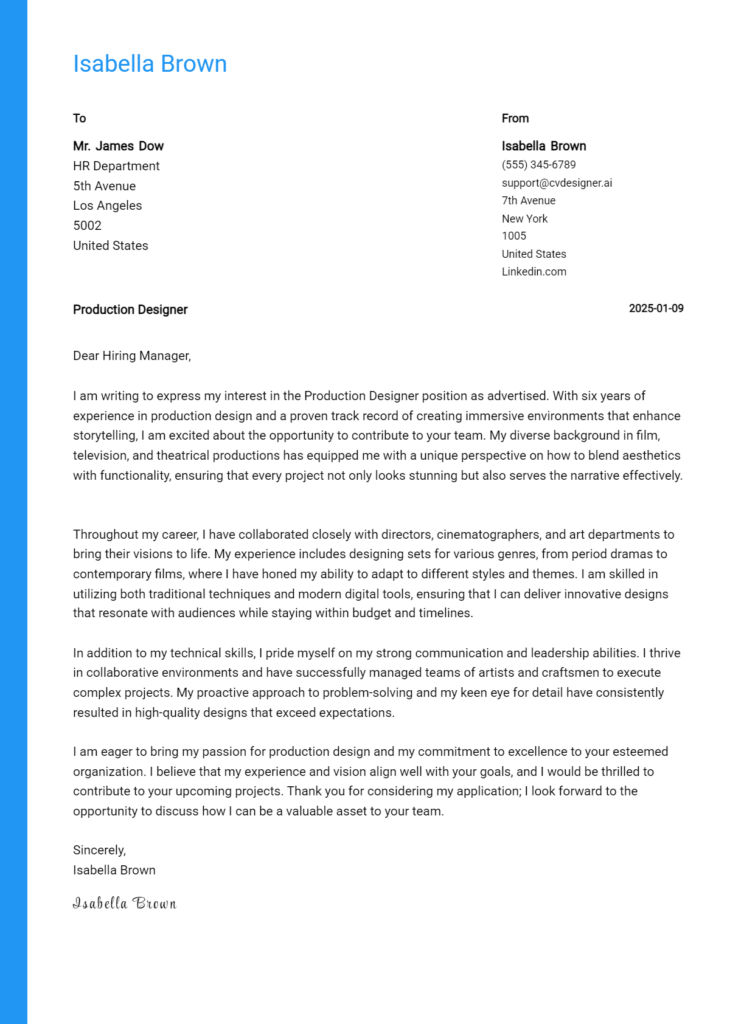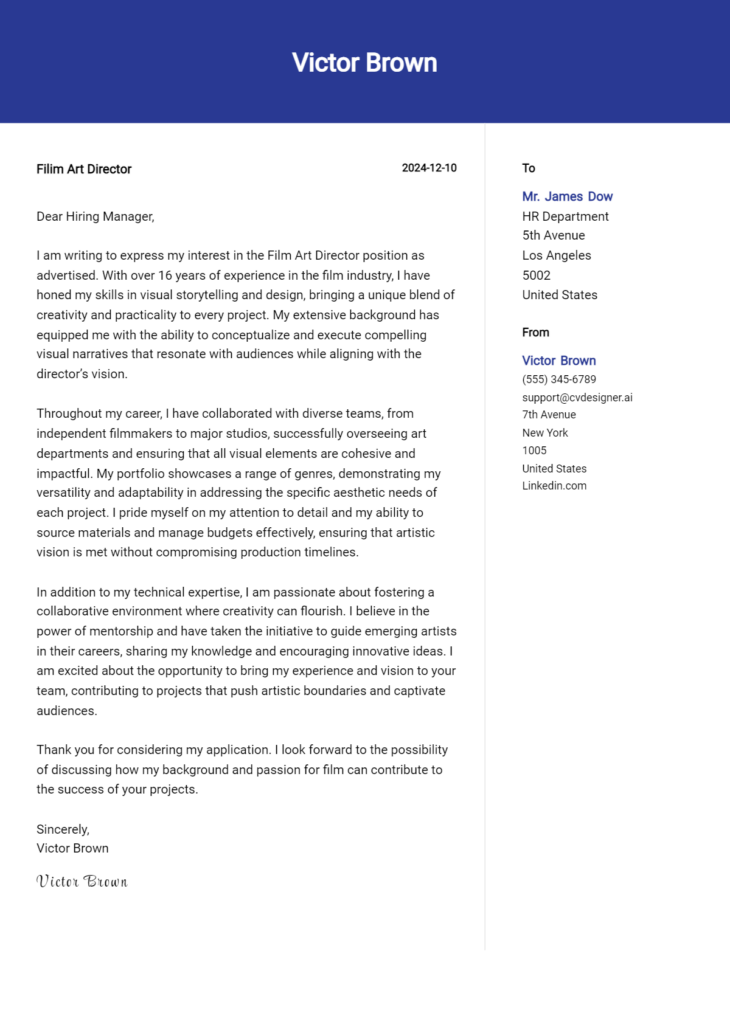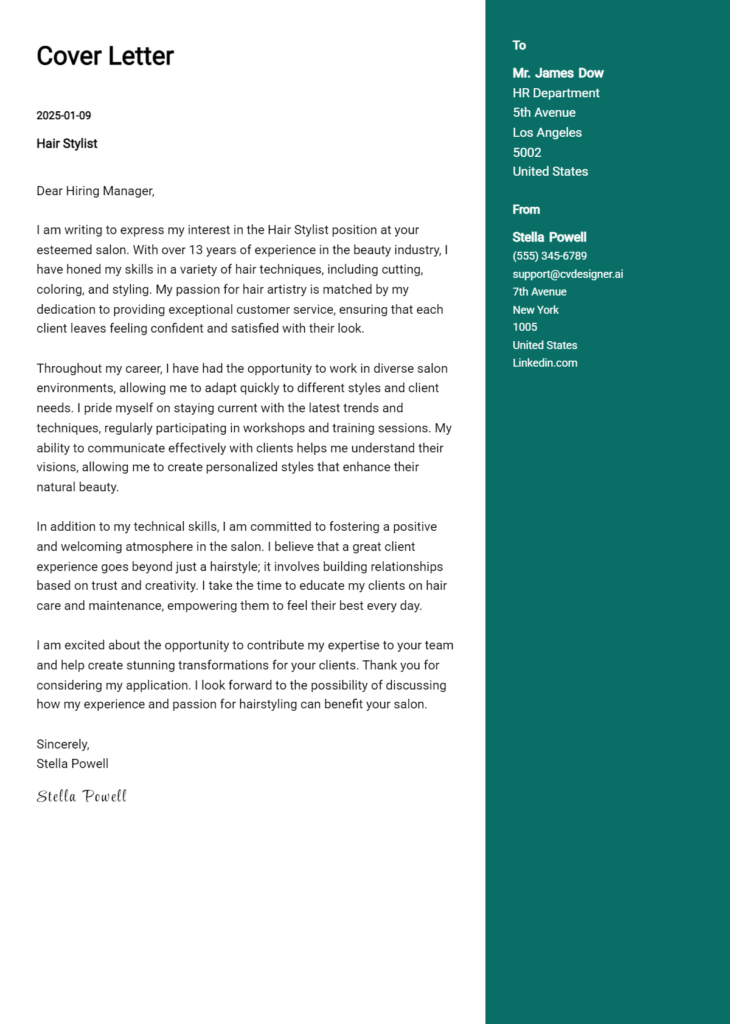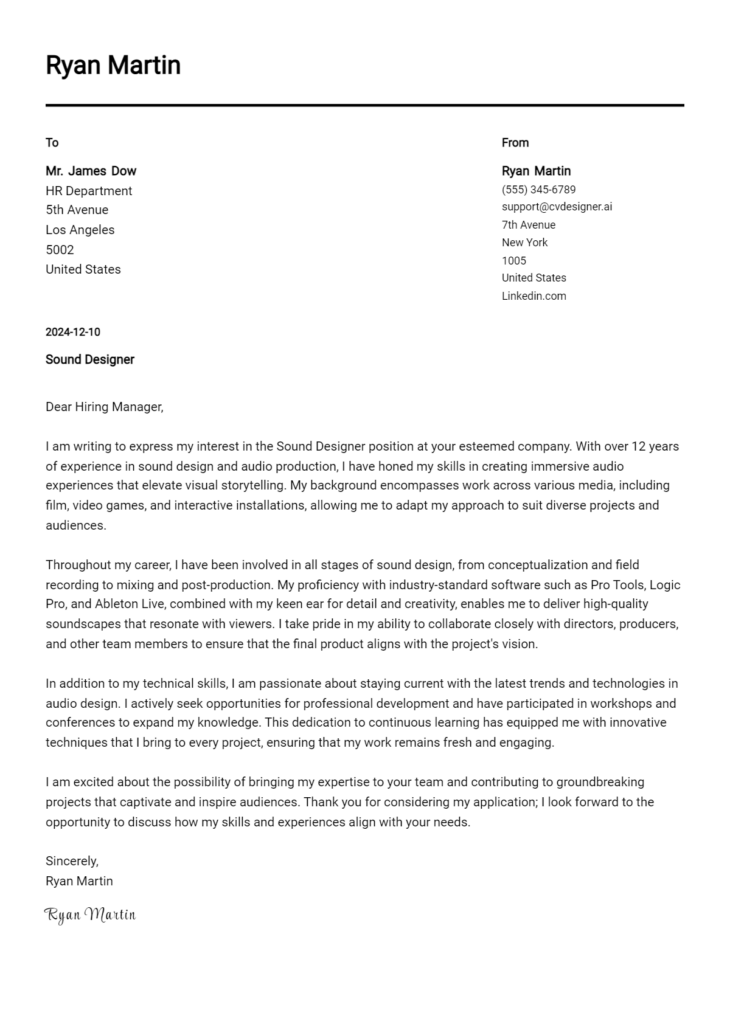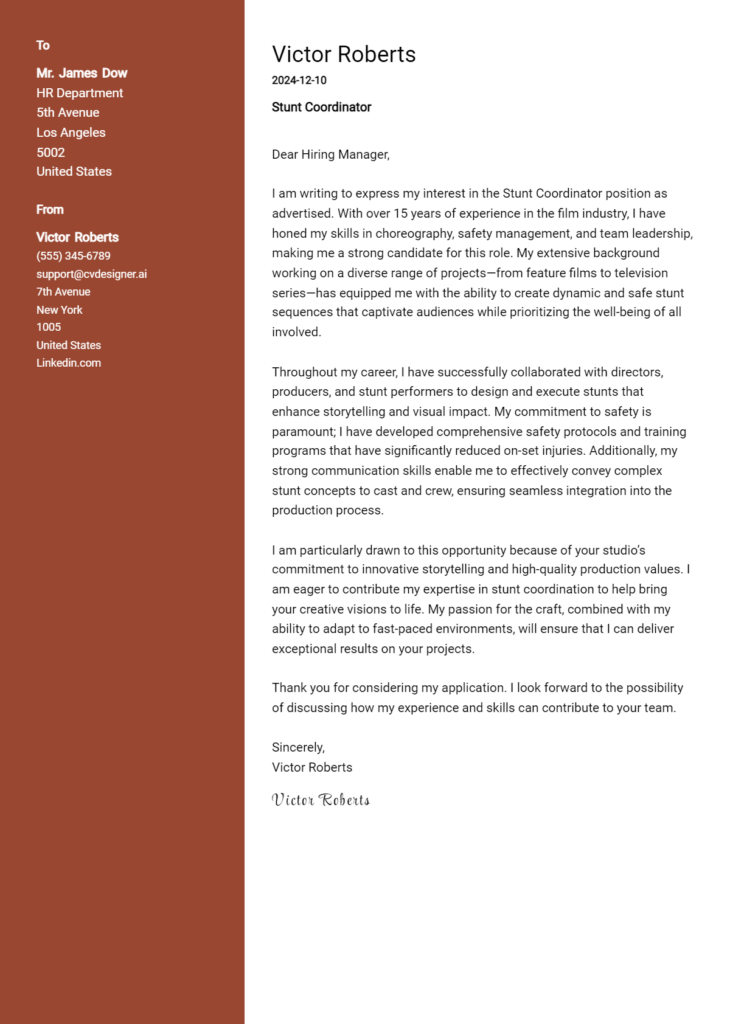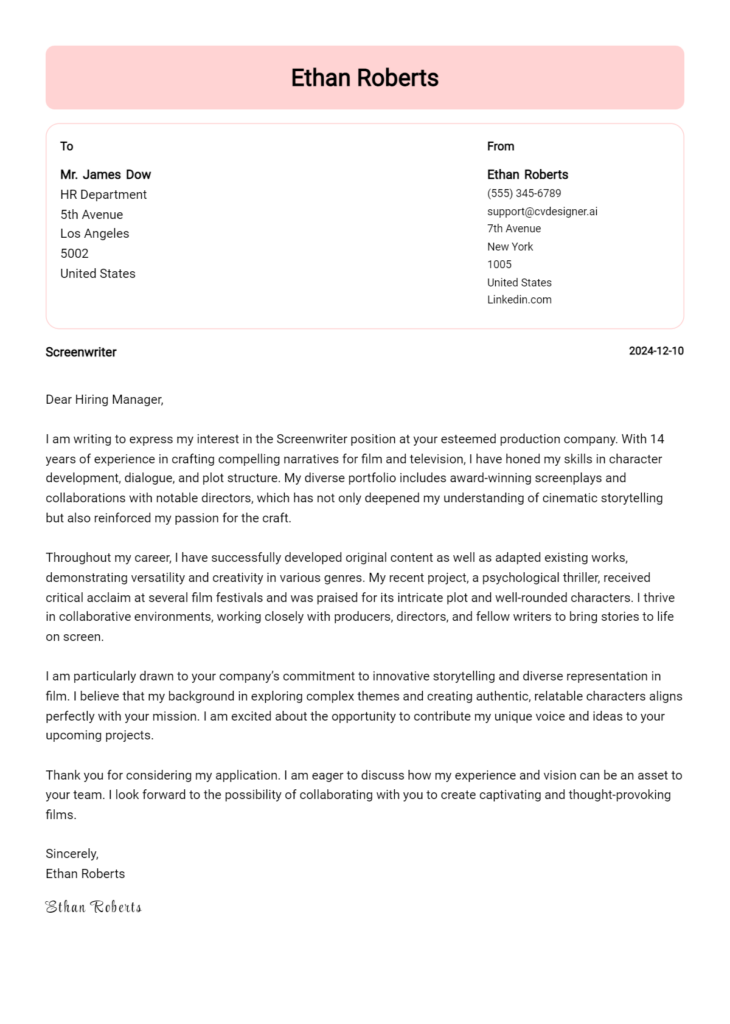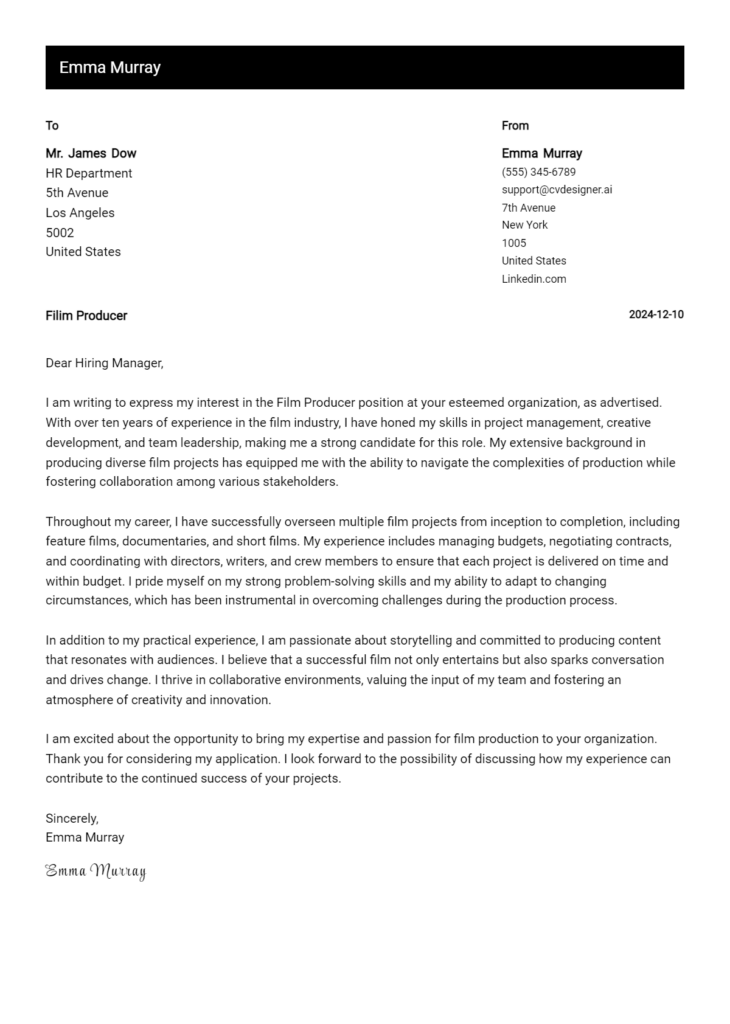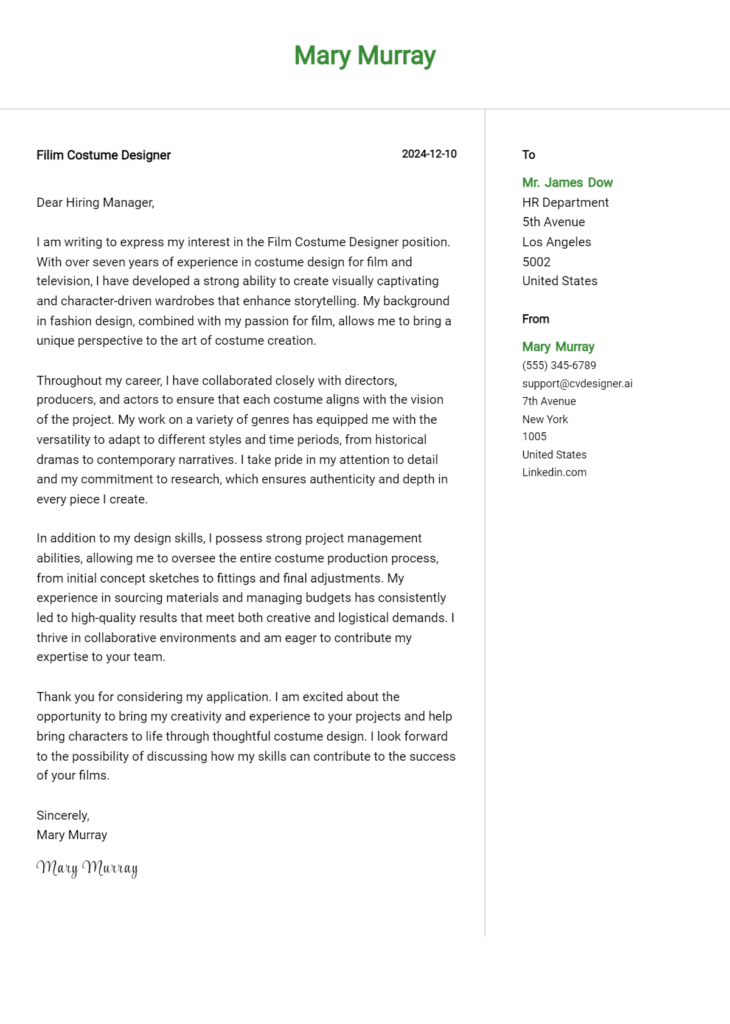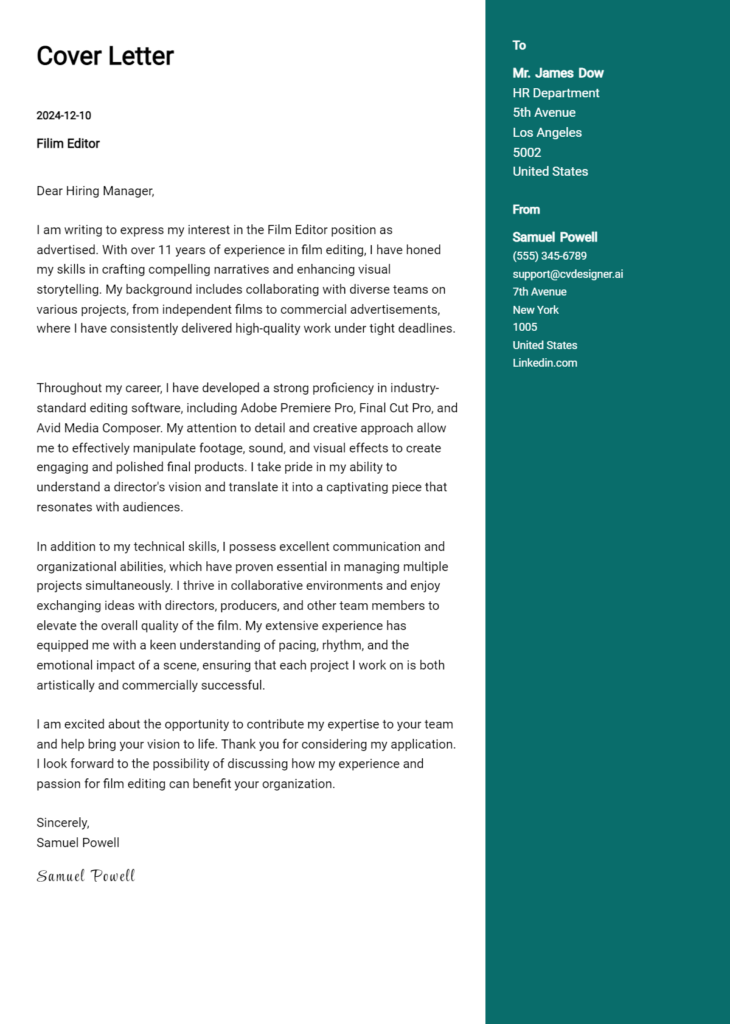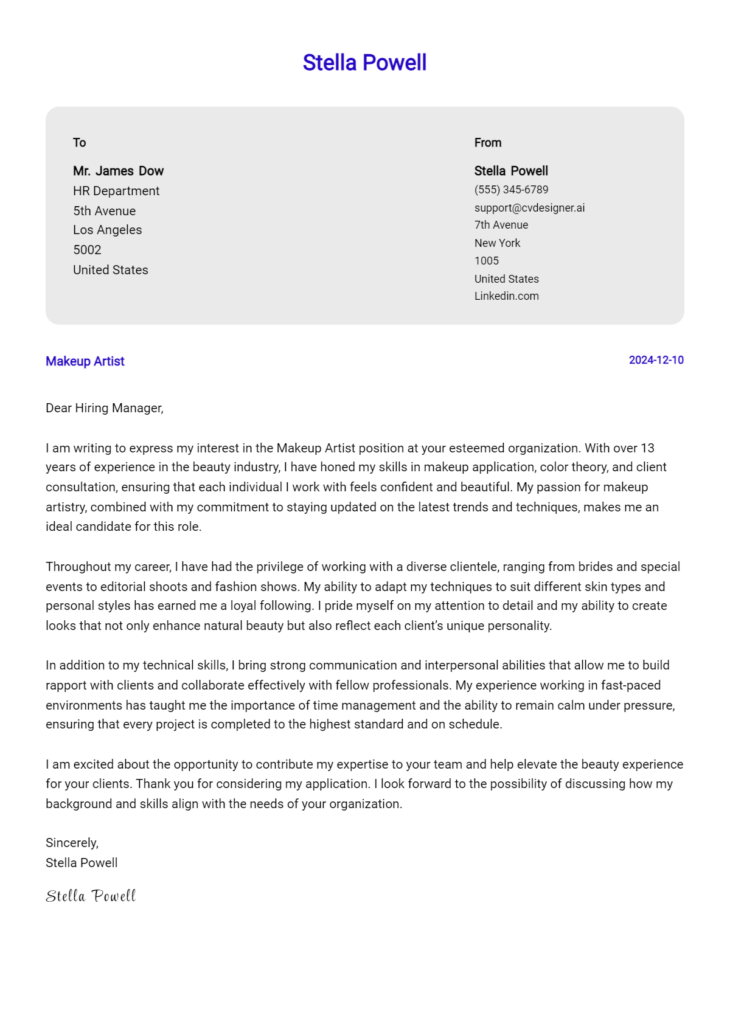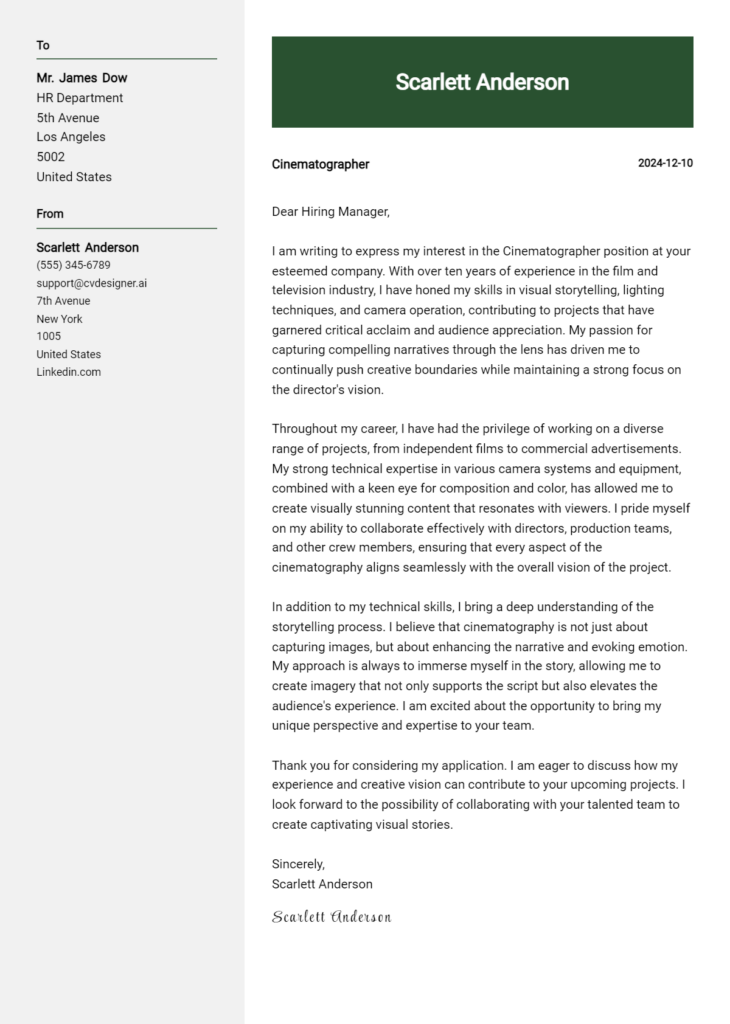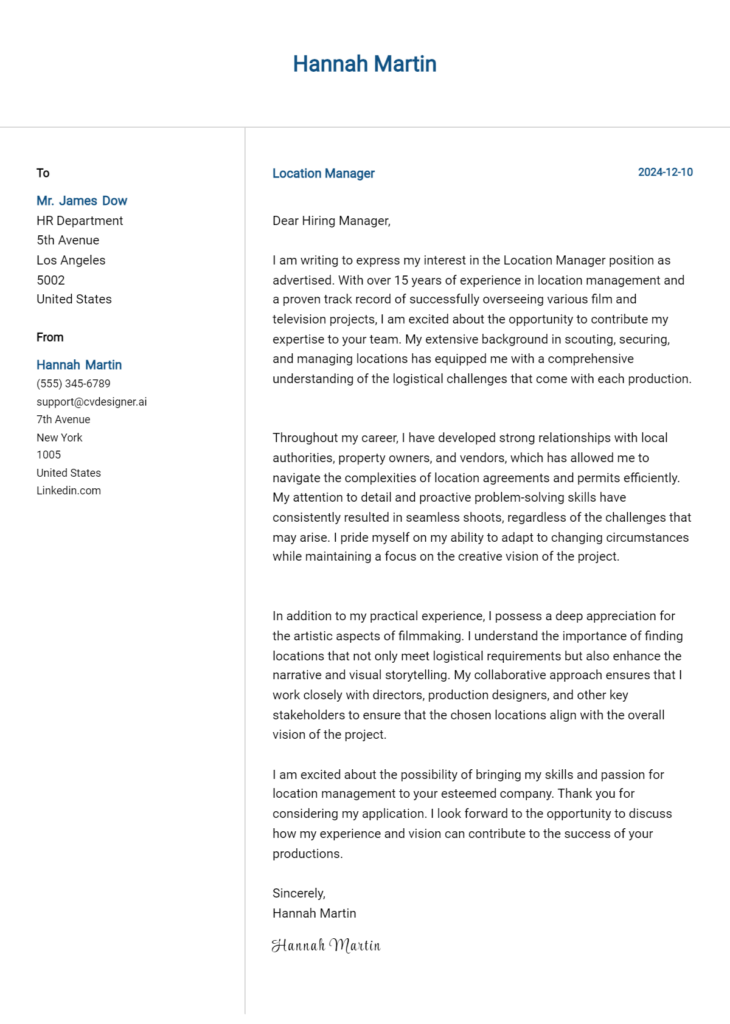Composer Cover Letter Examples
Explore additional Composer cover letter samples and guides and see what works for your level of experience or role.
How to Format a Composer Cover Letter?
Crafting an effective cover letter is essential for composers, as it serves as your first opportunity to showcase not only your musical talents but also your creativity and professionalism. The way you format your cover letter speaks volumes about your attention to detail and your ability to communicate effectively. Just as a well-composed score captures the essence of a piece, a well-structured cover letter captures the attention of a hiring manager, conveying your passion and suitability for the role.
In this guide, we will outline the key components of a professional cover letter, providing insights and composer-specific examples to help you create a compelling document.
We will focus on the essential elements of a composer cover letter, including:
- Cover Letter Header
- Cover Letter Greeting
- Cover Letter Introduction
- Cover Letter Body
- Cover Letter Closing
Each section is crucial in highlighting your qualifications and artistic vision. Let’s break down each part and explore how to make your composer cover letter stand out.
The Importance of a Cover Letter Header for a Composer
A well-crafted cover letter header is essential for establishing professionalism and clarity in your application as a Composer. The header serves as the first impression, providing essential information such as your contact details, the date, and the recipient's information. This ensures that your letter is easily identifiable and accessible to the hiring manager or organization. A clear and professional header not only reflects your attention to detail but also sets the tone for the rest of your application.
An effective header should include:
- Your name
- Your address
- Your phone number
- Your email address
- The date of writing
- The recipient's name
- The recipient's title
- The recipient's organization
- The recipient's address
A strong header presents this information succinctly and in a visually appealing manner, while a weak header may lack clarity or professionalism.
Strong Example:
John Doe 123 Melody Lane Music City, CA 90210 (123) 456-7890 johndoe@email.com October 10, 2023 Jane Smith Director of Music Creative Arts Organization 456 Harmony Blvd Art Town, CA 90211
Weak Example:
Hey there, My name is John D. I live at 123 Melody and you can call me at 456-7890. Email me at johndoe@email.com. 10/10/23 To whom it may concern,
The Importance of the Cover Letter Greeting for a Composer
The cover letter greeting plays a crucial role in setting the tone for the rest of your letter. It serves as the first point of contact with the hiring manager and can significantly influence their perception of your application. A well-crafted greeting demonstrates professionalism and adds a personal touch by addressing the hiring manager directly. To make a strong impression, it's essential to avoid generic greetings like "To Whom It May Concern" or "Dear Sir/Madam." Instead, take the time to research and find the recipient's name, which shows a genuine interest in the position and the organization. Personalizing your greeting not only establishes a connection but also highlights your attention to detail—qualities that are invaluable in a composer.
Strong Greeting Example
Dear Ms. Johnson,
Weak Greeting Example
To Whom It May Concern,
The Importance of a Captivating Cover Letter Introduction for a Composer
A well-crafted cover letter introduction is crucial for a Composer as it serves as the first impression to the hiring manager. This opening paragraph should not only grab attention but also convey genuine enthusiasm for the role. It’s the perfect opportunity to briefly highlight key skills or notable achievements that set the candidate apart from others. A strong introduction can lead to a deeper exploration of the candidate's qualifications, while a weak one might result in the cover letter being overlooked. Below are examples of strong and weak cover letter introductions for a Composer role.
Strong Example
Dear [Hiring Manager's Name], As a passionate composer with over a decade of experience in scoring for film and television, I am thrilled to apply for the Composer position at [Company Name]. My work has not only garnered recognition at several prestigious festivals, including the [Specific Festival Name], but has also resonated with audiences worldwide, bringing stories to life through the power of music. I am eager to contribute my unique voice and innovative approach to your team, creating compelling soundscapes that enhance the storytelling experience.
Weak Example
To Whom It May Concern, I am writing to apply for the Composer job that I saw online. I have some experience with music and I think I would be a good fit. I can write different kinds of music, but I’m not sure what the company does exactly.
Purpose of the Cover Letter Body for a Composer
The cover letter body for a Composer serves as a crucial component in presenting the candidate's unique skills, experiences, and the value they can bring to the company. This section allows the composer to showcase their creative abilities, technical proficiency, and relevant projects that demonstrate their talent and contribution to past works. By detailing specific accomplishments—such as award-winning scores, successful collaborations with notable artists, or innovative compositions for various media—the composer can effectively illustrate their potential impact on the hiring organization. Furthermore, it provides an opportunity to convey passion for music and artistry, which is essential in this competitive field.
Strong Example
Dear [Hiring Manager's Name], I am excited to apply for the Composer position at [Company Name]. With over seven years of experience composing for film and television, I have successfully crafted original scores for projects such as the award-winning documentary "Voices of Change," which was featured at the Sundance Film Festival. My collaboration with renowned director [Director's Name] allowed me to explore diverse musical styles, resulting in a soundtrack that resonated with audiences and critics alike. Additionally, my work on the animated series "Adventures in Sound" earned a nomination for the Annie Awards, showcasing my ability to create engaging and memorable themes. I am eager to bring my unique blend of creativity and technical skills to [Company Name] and contribute to your innovative projects. Best regards, [Your Name]
Weak Example
Dear [Hiring Manager's Name], I am applying for the Composer job at [Company Name]. I have done some composing and I think I can do a good job. I once worked on a small project for a friend's film, but it didn't win any awards. I like music and I have some ideas that could work. I hope you consider my application. Sincerely, [Your Name]
Importance of the Cover Letter Closing for a Composer
A well-crafted closing paragraph in a cover letter is crucial for a composer as it serves to summarize qualifications, reiterate genuine interest in the position, and encourage the hiring manager to take the next steps. This section should leave a lasting impression, reinforcing the candidate's suitability for the role and prompting further engagement, such as reviewing the resume or scheduling an interview. A strong closing can set a positive tone that leads to potential opportunities, while a weak closing may diminish the overall impact of the letter.
Strong Example
Thank you for considering my application for the Composer position at [Company Name]. With over ten years of experience in film scoring and a deep passion for creating evocative musical narratives, I am excited about the possibility of contributing to your team. I believe my unique blend of creativity and technical skill aligns perfectly with your vision. I look forward to the opportunity to discuss how my background and ideas can enhance your projects. Please find my resume attached for your review, and I hope to schedule a time for us to connect soon.
Weak Example
I hope you like my application. I have some experience in music. Please check my resume. I guess I’d like to talk about the job if you want.
These tips will assist candidates in crafting an effective cover letter for a Composer position. A compelling cover letter is crucial for standing out in a competitive field, as it allows you to showcase your technical skills, problem-solving abilities, knowledge of the software development life cycle (SDLC), teamwork experiences, and a passion for continuous learning. By emphasizing these areas, you can create a strong narrative that highlights your qualifications and enthusiasm for the role.
Tips for Writing an Effective Composer Cover Letter
Highlight Your Technical Skills
Clearly outline your technical skills related to music composition and production. Mention specific software and tools you are proficient in, such as Sibelius, Finale, or digital audio workstations (DAWs) like Ableton Live or Logic Pro. Providing examples of how you've used these tools in past projects can demonstrate your expertise and readiness for the role.Demonstrate Problem-Solving Abilities
Use your cover letter to illustrate your problem-solving abilities in the context of composition. Discuss a challenging project where you had to think creatively to overcome obstacles, such as tight deadlines or working with a difficult client. Highlight how your innovative solutions contributed to the success of the project.Show Knowledge of SDLC
If applicable, convey your understanding of the software development life cycle (SDLC) as it pertains to music composition and production. Explain how you approach the stages of planning, development, testing, and deployment in your projects. This will show your ability to integrate technical processes into your creative work.Emphasize Teamwork and Collaboration
Music composition often involves collaboration with other musicians, directors, and sound engineers. Share experiences where you successfully worked as part of a team, highlighting your communication skills and ability to incorporate feedback. This demonstrates your capability to thrive in a collaborative environment.Express a Passion for Continuous Learning
The music industry is constantly evolving, and it’s essential to stay updated with new trends and technologies. Mention any recent courses, workshops, or personal projects that reflect your commitment to continuous learning. This not only showcases your dedication but also positions you as a proactive and adaptable candidate.
For more guidance on crafting your cover letter, consider checking out some cover letter templates or try using a cover letter builder to help structure your document effectively.
Common Mistakes to Avoid in a Composer Cover Letter
Crafting a compelling cover letter is essential for any composer looking to make a strong impression. Avoiding common mistakes can significantly enhance your chances of landing an interview. Here are some pitfalls to steer clear of when writing your cover letter:
Generic Templates: Using a one-size-fits-all template can make your letter feel impersonal. Tailor your content to the specific role and organization you’re applying to.
Ignoring the Format: A poorly structured cover letter can be off-putting. Ensure you follow a clear cover letter format that highlights your skills and experiences effectively.
Lack of Specificity: Vague language can dilute your message. Be specific about your accomplishments and how they relate to the position.
Overemphasizing Technical Skills: While technical skills are important, focusing too much on them without mentioning creative aspects can make your letter unbalanced. Showcase both your technical proficiency and your artistic vision.
Neglecting the Audience: Failing to research the organization can lead to a mismatch in tone and content. Know your audience and tailor your message accordingly.
Typos and Grammatical Errors: Any mistakes can undermine your professionalism. Proofread your letter carefully or seek a second opinion to catch errors.
Forgetting a Call to Action: Ending your letter without a clear call to action can leave the reader unsure of the next steps. Express your enthusiasm for the opportunity and suggest a follow-up.
By avoiding these common mistakes and utilizing helpful cover letter examples, you can create a cover letter that stands out in a competitive field and showcases your unique talents as a composer.
Cover Letter FAQs for Composer
What should I include in my cover letter as a Composer?
When crafting your cover letter, highlight your unique musical style and how it aligns with the prospective project or company. Begin by introducing yourself and summarizing your experience in composition, including genres you specialize in and notable projects. Mention any collaborations with directors, musicians, or other composers that showcase your ability to work within a team. Don't forget to give specific examples of your work, such as film scores, orchestral pieces, or arrangements. Additionally, express your passion for the project at hand and how your vision can enhance it. Finally, conclude with a strong call to action, inviting the reader to discuss your work further.
How can I demonstrate my skills in my cover letter?
To demonstrate your skills in your cover letter, use specific examples of your composition work that illustrate your range and versatility. Describe the techniques you employ in your compositions, such as orchestration, harmony, or melody development, and how these contribute to the emotional impact of your music. You can mention awards, recognitions, or performances that validate your skills. Additionally, if you’ve worked with notable artists or on recognized projects, include these experiences to establish credibility. If applicable, incorporate links to your portfolio or recordings of your work within the cover letter to provide tangible evidence of your abilities.
Should I tailor my cover letter for each opportunity?
Absolutely, tailoring your cover letter for each opportunity is crucial. A generic cover letter may fail to capture the attention of potential employers, especially in a creative field like composition. Research the specific project or organization and reference relevant details in your letter. Discuss how your previous experiences and musical style align with their needs or vision. This personal touch demonstrates your genuine interest in the opportunity and shows that you’ve invested time in understanding their work. By tailoring your cover letter, you also have the opportunity to highlight skills and experiences that are most relevant to the specific position, making your application more compelling.
How long should my cover letter be?
A cover letter for a composer should ideally be one page long, consisting of three to four concise paragraphs. Aim for clarity and brevity while ensuring you convey your passion, skills, and experiences effectively. Start with a strong opening that captures interest, followed by a body that highlights your qualifications and relevant experiences. Each paragraph should focus on a specific theme, such as your background, notable works, or your enthusiasm for the opportunity. Conclude with a compelling closing statement that encourages further discussion. Keeping your cover letter succinct while still engaging will make it easier for hiring managers to read and remember your application.
Build your Cover Letter in minutes
Use an AI-powered cover letter builder and have your letter done in 5 minutes. Just select your template and our software will guide you through the process.

